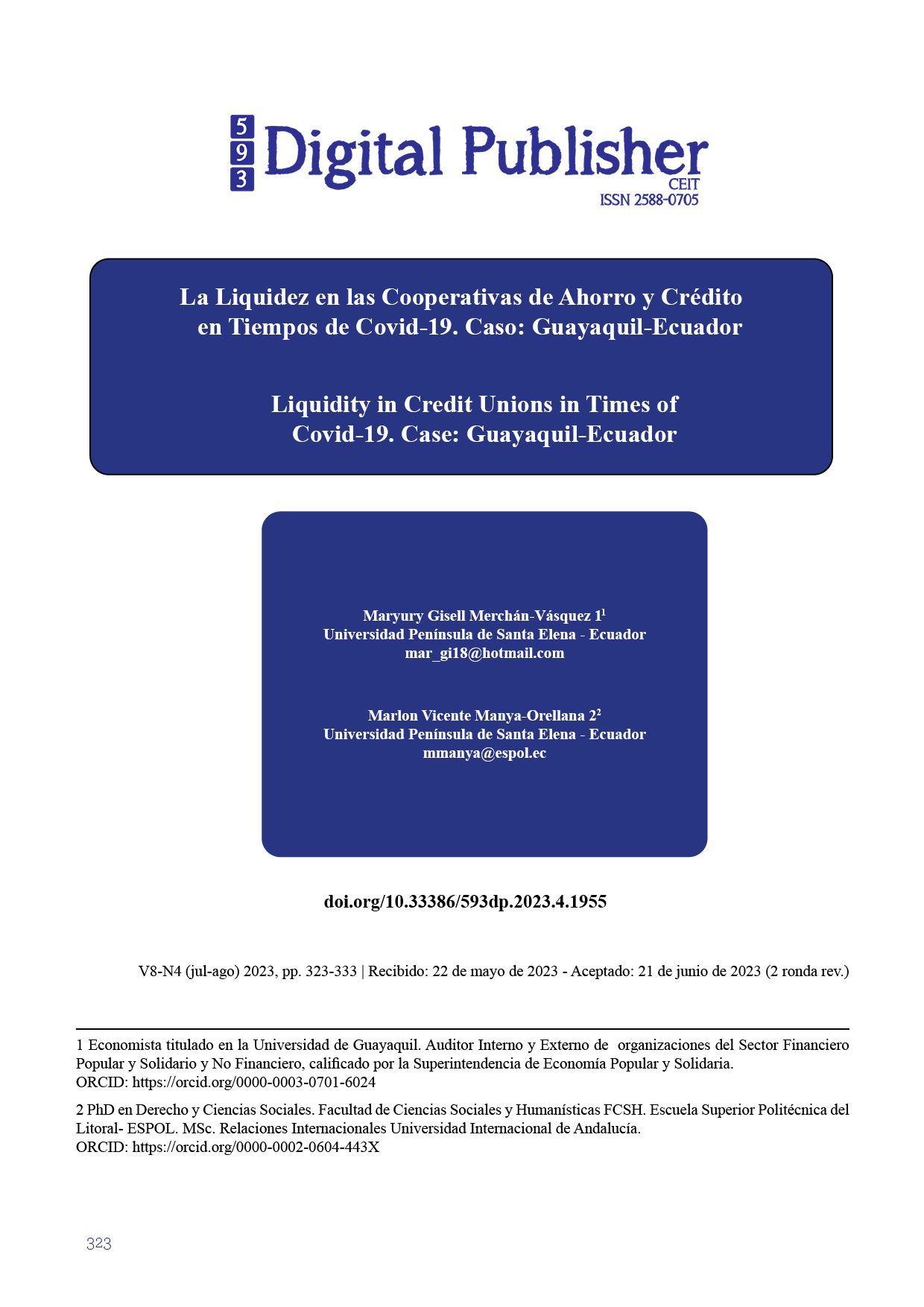Liquidity in Credit Unions in Times of Covid-19. Case: Guayaquil-Ecuador
Main Article Content
Abstract
The general objective of this study is to determine the indicators that affected the popular and solidary financial system in the city of Guayaquil during the period 2020 to 2022, analyze the measures adopted by cooperative members to face liquidity risk without affecting the income statement; Additionally, it describes the strategies they used in the capture of deposits to deliver them to the public through credit products. Methodology: The method used is a quantitative approach of descriptive type, in which hypothesis testing is carried out through statistical analysis using the database of cooperatives that belong to the popular and solidarity financial sector obtained from the Superintendence of Popular and Solidarity Economy (SEPS) of the years 2020, 2021 and 2022. The study population is twenty-five cooperatives that belong to the popular and solidarity financial sector (SFPS) of the city of Guayaquil to establish the measures used by cooperatives to face their obligations to members during the time of pandemic by COVID-19. Results: The research responds to the hypothesis: The liquidity of savings and credit cooperatives was negatively affected financially by the health emergency due to Covid-19 due to the paralysis of economic activities in the city of Guayaquil.
Downloads
Article Details

This work is licensed under a Creative Commons Attribution-NonCommercial-ShareAlike 4.0 International License.
1. Derechos de autor
Las obras que se publican en 593 Digital Publisher CEIT están sujetas a los siguientes términos:
1.1. 593 Digital Publisher CEIT, conserva los derechos patrimoniales (copyright) de las obras publicadas, favorece y permite la reutilización de las mismas bajo la licencia Licencia Creative Commons 4.0 de Reconocimiento-NoComercial-CompartirIgual 4.0, por lo cual se pueden copiar, usar, difundir, transmitir y exponer públicamente, siempre que:
1.1.a. Se cite la autoría y fuente original de su publicación (revista, editorial, URL).
1.1.b. No se usen para fines comerciales u onerosos.
1.1.c. Se mencione la existencia y especificaciones de esta licencia de uso.
References
Ley Orgánica de Economía Popular y Solidaria Ley 0, (2018) (testimony of Asamblea Nacional de Ecuador). Https://www.gob.ec/sites/default/files/regulations/2020-02/Documento_Ley-Org%C3%a1nica-Econom%C3%ada-Popular-Solidaria.pdf
Banco Central del Ecuador. (2020). Impacto social del COVID-19 en Ecuador: desafíos y respuestas. Organización para la Cooperación y el Desarrollo Económicos. Https://www.oecd.org/dev/Impacto-social-COVID-19-Ecuador.pdf
Banco Central del Ecuador. (2022). Todo lo que no sabías sobre las cooperativas en Ecuador - Banco Central del Ecuador. Educación Financiera y Monetaria. Https://www.bce.fin.ec/educacion-financiera/articulos/todo-lo-que-no-sabias-sobre-las-cooperativas-en-ecuador
Fondo Monetario Internacional. (2021). Informe sobre la estabilidad financiera mundial. Resumen Ejecutivo. Https://www.imf.org/es/Publications/GFSR/Issues/2021/10/12/global-financial-stability-report-october-2021#Overview
Guerrero, J., & Peñaloza, V. (2022). Estudio y análisis del riesgo de liquidez en las cooperativas de ahorro y crédito de los segmentos 1, 2 y 3 de Ecuador. Revista de la Universidad del Azuay, 9, 210-237. Https://revistas.uazuay.edu.ec/index.php/udaakadem/article/view/483/731
Hernández, R., Fernández, C., & Baptista, M. (2014). Metodología de la Investigación: Vol. Sexta edición (M. Rocha, Ed.; mcgraw-HILL).
Mercer. (2020). Impacto del COVID-19 en la economía de América Latina. Https://www.latam.mercer.com/our-thinking/impacto-del-covid-19-en-la-economia-de-america-latina.html
Suplemento Año I-No 160, (2020) (testimony of Ministerio de Salud Pública de Ecuador). Www.registroficial.gob.ec
Decreto No 1017 - Declara el estado de excepción por calamidad pública en todo el territorio nacional por los casos de coronavirus confirmados y la declaratoria de pandemia de COVID-19 por parte de la Organización Mundial de la Salud (OMS)., Registro Oficial de Ecuador (2020). Https://faolex.fao.org/docs/pdf/ecu194244.pdf
Palermo, V. (2019). La economía política de un Estado débil - Latinoamérica 21. Latinoamérica21. Https://latinoamerica21.com/es/la-economia-politica-de-un-estado-debil/
Superintendencia de Economía popular y solidaria. (2015). Análisis de Riesgo de Liquidez del Sector Financiero Popular y Solidario Quito, diciembre de 2015. Https://www.seps.gob.ec/wp-content/uploads/Riesgo-de-Liquidez-Corregido.pdf
Vásquez Lacres, M. C., Salazar Vázquez, L. M., & Gavilanes, F. I. (2021). Fórmula estratégica empresarial para pymes en Ecuador ante la covid-19. Revista Universidad & Empresa, 23(40), 1-22. Https://doi.org/10.12804/revistas.urosario.edu.co/empresa/a.9309



